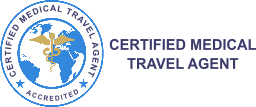Medical tourism facilitators help people who travel to other countries for medical treatments. They can be either individuals or companies and they make the process of getting medical treatment in a foreign country easier.
What Do They Do?
These facilitators do many things to help patients. They:
-
Plan Travel: This includes arranging flights and managing travel details to ensure a smooth journey for the patient.
-
Secure Accommodations: Identifying and booking suitable lodging options for the duration of the patient’s medical stay.
-
Connect with Healthcare Providers: Serving as the vital link between patients and healthcare facilities, including hospitals and doctors in the destination country.
The Importance of the Facilitator’s Role
The effectiveness of a medical tourism facilitator is underscored by their ability to:
-
Simplify Processes: By handling various logistical aspects, facilitators ease the complexity of medical travel for patients.
-
Offer Knowledge and Guidance: Utilizing their understanding of global medical treatments, facilitators provide invaluable advice to patients.
-
Overcome Language and Cultural Challenges: Their ability to navigate language barriers and their cultural knowledge are crucial in facilitating clear communication between patients and healthcare providers.
Things to Consider for Aspiring Medical Tourism Facilitators:
-
Understand Patient Concerns: It’s crucial to recognize what medical tourists look for in a facilitator. They want someone knowledgeable, trustworthy, and attentive to their needs. Understand the common concerns of medical tourists, such as the quality of healthcare, cost, language barriers, and cultural differences.
-
Quality of Service: Aim to provide top-quality service. This means being well-informed about various medical procedures, hospitals, and destinations. Your ability to offer accurate and helpful information will set you apart.
-
Cost Transparency: Be clear about your fees and the overall cost of medical procedures. Patients appreciate transparency and no hidden costs.
-
Communication Skills: Effective communication is key. You should be able to explain medical and travel details clearly and be responsive to your clients’ questions and concerns.
-
Cultural Sensitivity: Develop an understanding of different cultures. Being culturally sensitive can enhance the comfort and trust of your clients.
-
Certification in Medical Tourism: Consider getting accredited as a Certified Medical Travel Agent. This certification shows that you have the necessary knowledge and skills in this field. It can build your credibility and trustworthiness in the eyes of potential clients.
-
Network Building: Develop a strong network with healthcare providers, hospitals, and travel agencies. A good network can provide more options and better services for your clients.
-
Staying Informed: Keep up-to-date with the latest trends and developments in medical tourism. This industry is constantly evolving, and staying informed will help you provide the best service.
Becoming a successful medical tourism facilitator requires a combination of knowledge, skills, and the right certification. By focusing on these aspects, you can build a reputable and effective service that caters well to the needs of medical tourists.
Reach Your Full Potential in Medical Tourism with MTB
At MTB, we are dedicated to supporting professionals and organizations in the medical tourism industry as they strive for success. As a leading provider of certification, contracts, marketing, and support, we offer comprehensive programs, expert guidance, and valuable resources that are designed to help our members achieve their goals and reach their full potential in the global healthcare market. With a focus on excellence and innovation, we help our members stay ahead of the competition and navigate the complex and dynamic world of medical tourism.
Tel/WhatsApp: +1 (561) 909-7178
Email: Info@MedicalTourismBusiness.com








